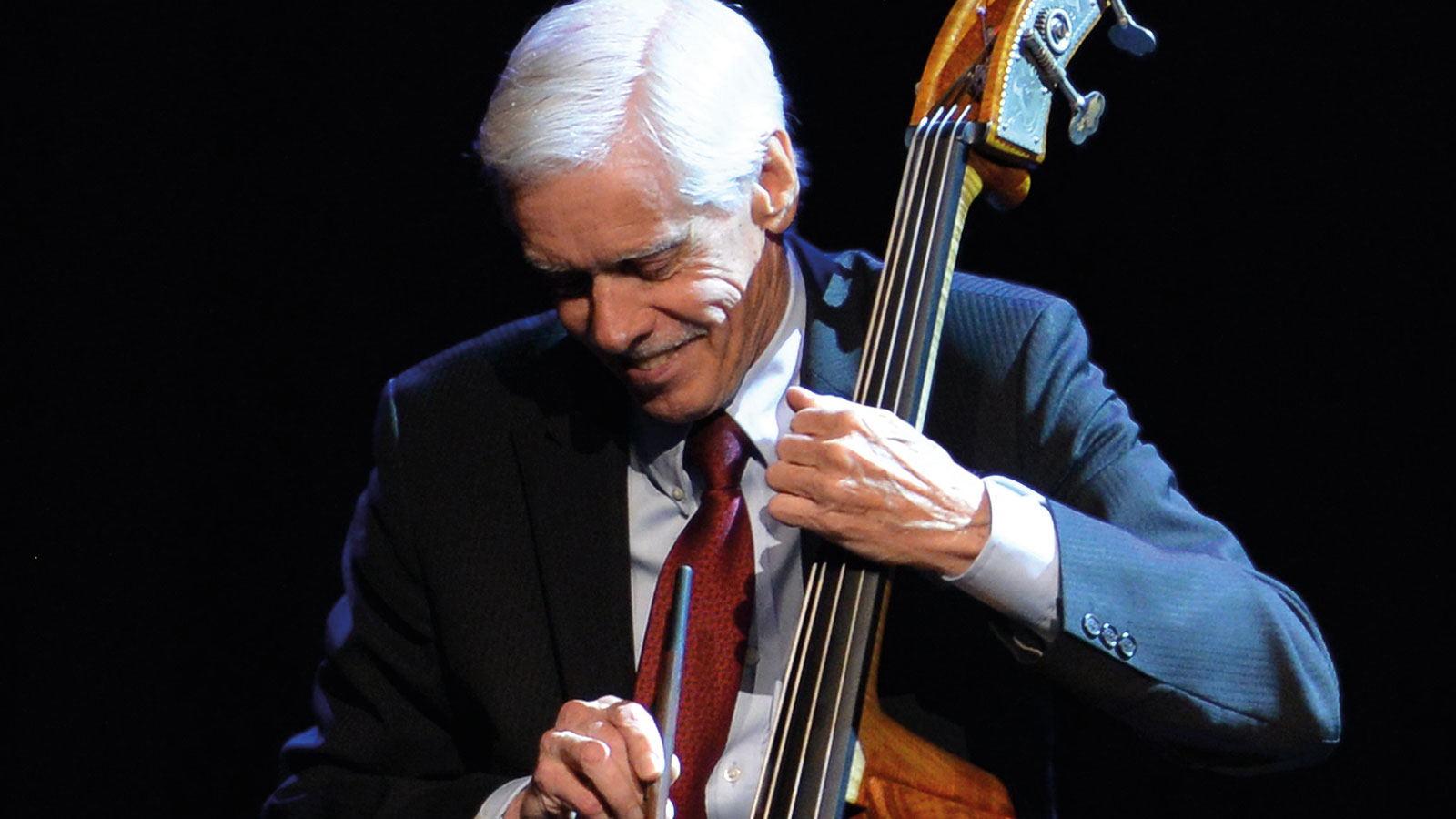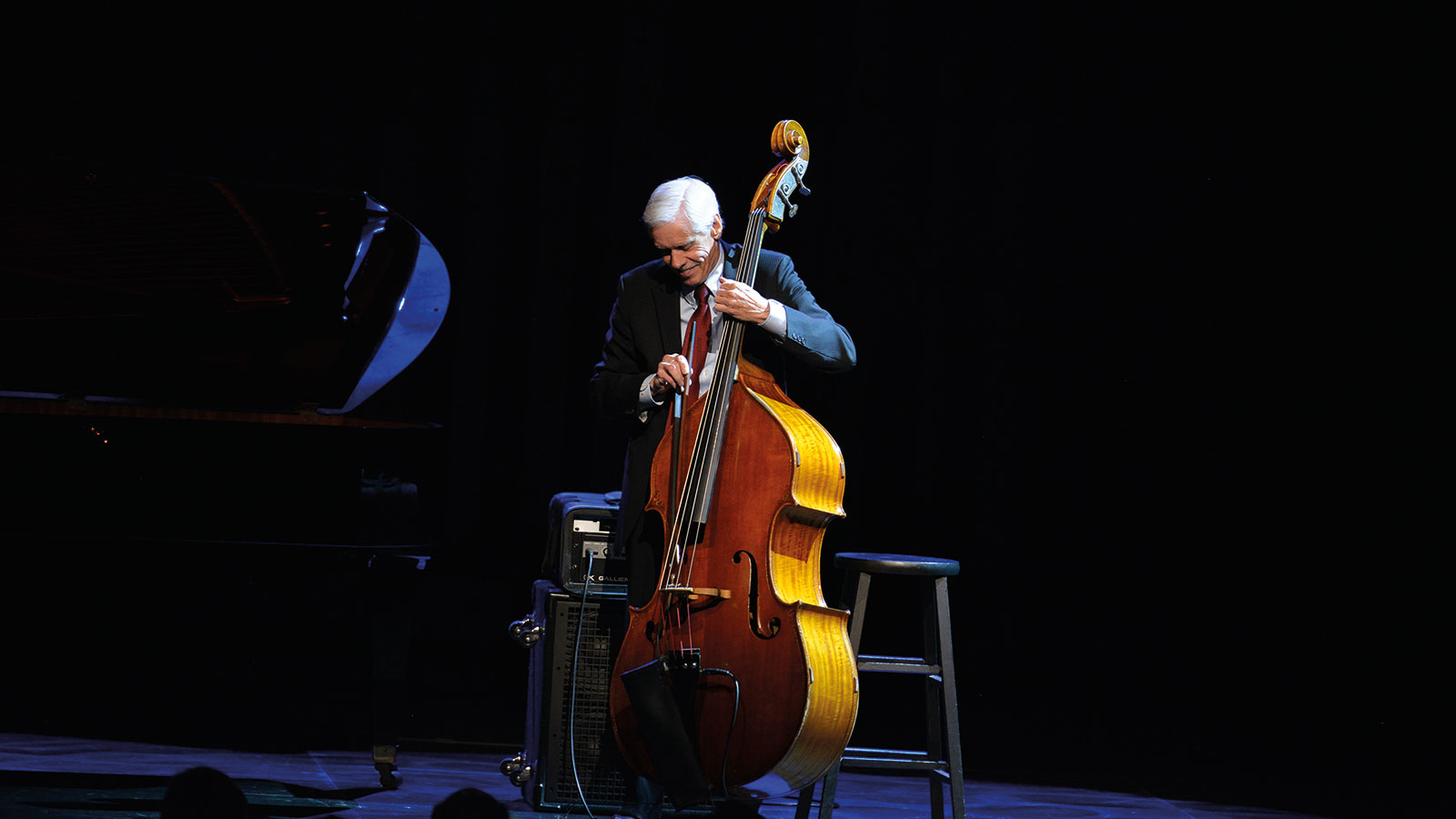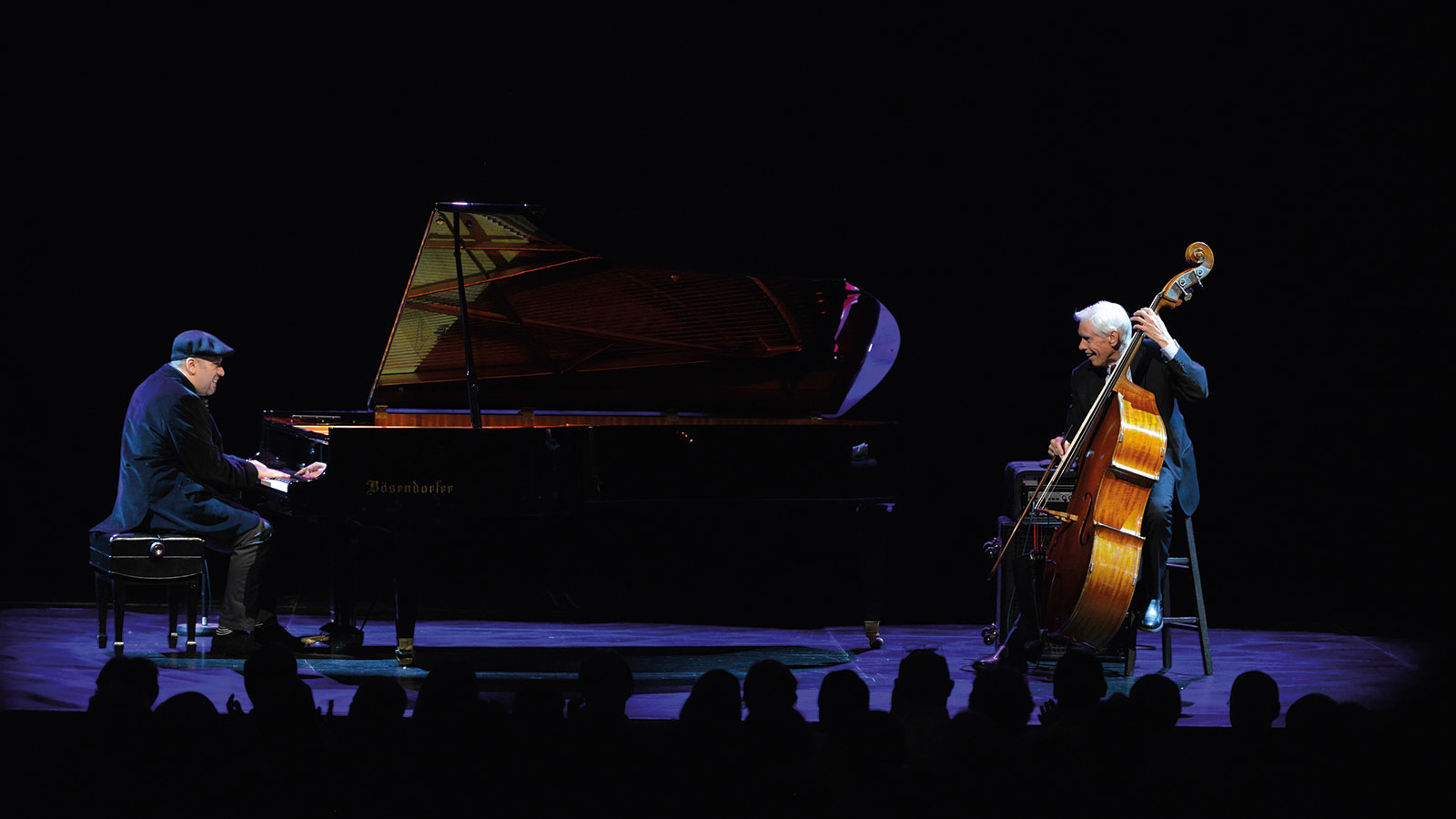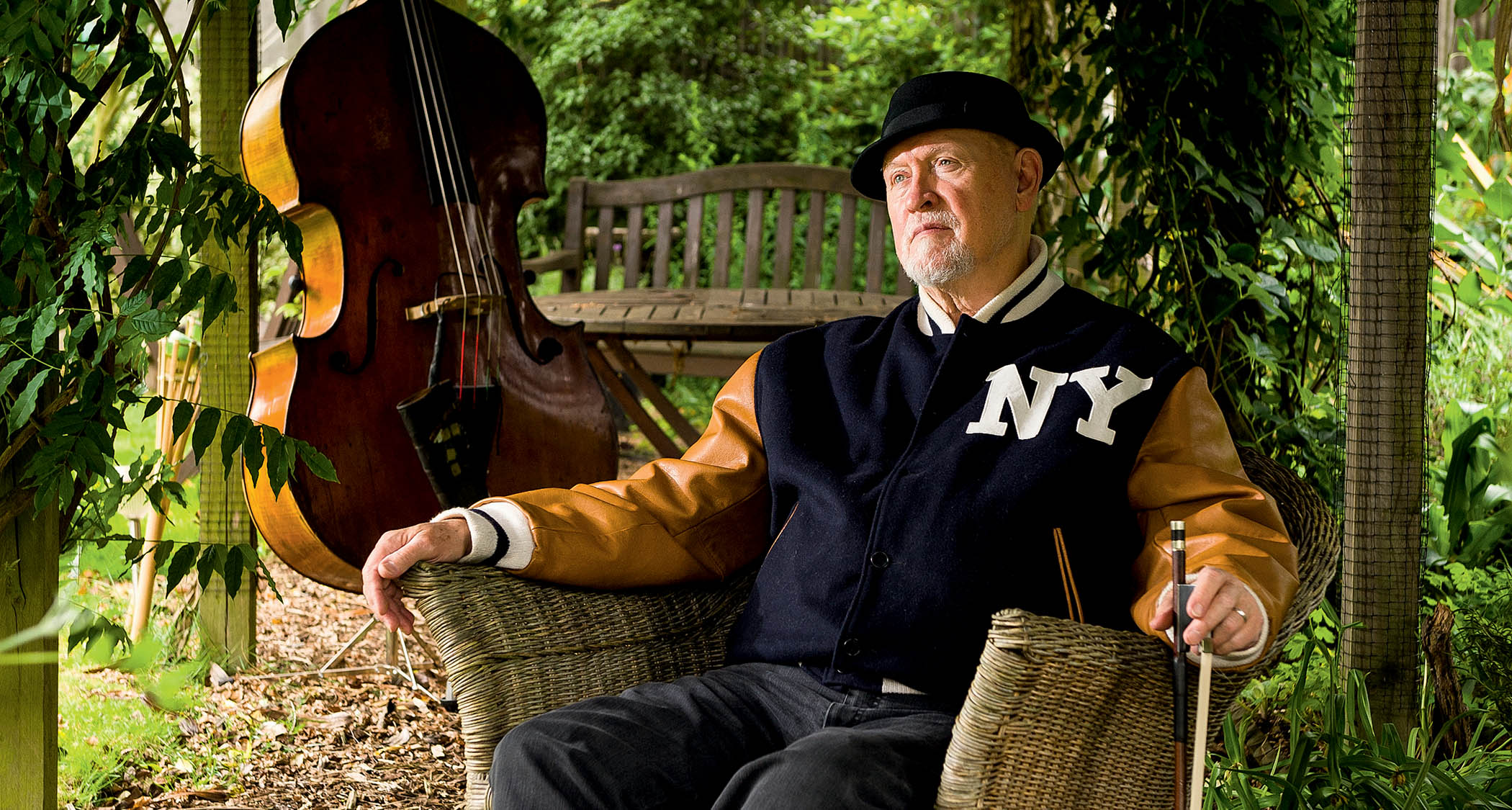Dave Young: “When you were forced to transcribe stuff from records, that taught you something. It developed your ear and your sense of songwriting”
The Canadian jazz bass stalwart reflects on his roots as a bass player, working with Oscar Peterson and what technology has taken from learners

Mantra is the sixteenth album from the Toronto-based songwriter, bassist, and Juno Award-winning member of the Order of Canada, Dave Young.
Recorded with a sextet of trumpeter Kevin Turcotte, reedist Perry White and a backline of Reg Schwager on guitar, Brian Dickinson on piano, and Terry Clarke on drums, Mantra also includes as guests Ewen Farncombe on organ, John Johnson on alto sax and flute, and Les Allt on flute.
Even if you don’t play upright bass, you will be fascinated by the tone and bounce of Young’s bass parts, which are unselfish but which also extend to some fiery soloing.
I don’t want to be in the spotlight all the time.
How did you choose the songs for Mantra, Dave?
“The majority of them are original tunes, but whenever I record anything in a CD format, I always like to mix in a few jazz standards, because then people will think, ‘Oh, yeah, I know this tune!’ which makes it more approachable.”
The bass on the album is mixed high, but it leaves space for everybody else, like a true bandleader.
“Well, I always like to give the guys plenty of room. I mean, that’s why they’re there. I don’t want to be in the spotlight all the time.
All the latest guitar news, interviews, lessons, reviews, deals and more, direct to your inbox!
That said, I did notice that 30 seconds into track one there is a bass solo.
"Yeah, well, who else is gonna ask you to do that? Ha ha!”
Tell us about the instruments that you use.
“The bass is a Poellmann, German made. It’s worked very well for me over the 20 years that I’ve owned it. I think it was made in the late Seventies. I’ve had older instruments, but that was during a period when I played in a lot of orchestras of varying capacities. Now I basically have modern instruments.”
Is there a significant difference from the player’s point of view between old and new basses?
“The price! These things are so darn expensive now. The older instruments that I’ve owned in the past are great, there’s no question about it. They don’t necessarily play easily, but they all sound great.
“Personally, I like the fact that a modern system doesn’t require a huge amount of maintenance. As a bass player, I’m sure you’re aware of the endless repairs and cracks that always need fixing, so I usually prefer to play modern instruments for that reason.”
How did you get started as a bass player?
“I started out playing the violin when I was a youngster, maybe 10 or 12 years old. Then I graduated to the guitar, which I played for a long time in various groups. I do a lot of writing and arranging, so I can find my way around the piano too. The way that I took up the bass was unusual, I guess. I was playing the guitar in a dance band, which was a very good gig at the time. It was a weekend gig at the university where I was going to school. This would be in 1958 or 1959 – somewhere in that time period.
I prefer the string bass – I spent almost a lifetime trying to figure it out — but the electric bass, I still practice
“One night, the bandleader said, ‘Dave, if you want to keep this particular engagement, come next week with a bass. We’re gonna drop the guitar, and the bass player over there is leaving, because he’s drinking too much’.
“So I went out on Monday morning, bought an upright bass and showed up on Friday night with it and played, having studied it in the interim. I went straight into it. I bought the bass on Monday and then played it until Friday. I don’t really know how I did it, but I was intent on keeping the gig, so I just did it.”
As this was 1958 or ’59, was the band you were in playing any rock’n’roll?
“No, it was a dance band – you know, three or four horns and the guitar plus a rhythm section. I was very much into rock’n’roll, though. I had my own group at one point, and we used to sing Elvis Presley material. It was fairly brief, probably about six or eight months, but it was very successful. But all along, jazz was attractive to me because it was more than three chords. That’s really why I gravitated towards improvising.”

Do you play the electric bass guitar as well?
“Yeah, I played it a lot. When I moved to Toronto, I played the electric bass for years, doing session work. I still play it, actually: I have a group that does all Donny Hathaway material. I prefer the string bass – obviously, because I spent almost a lifetime trying to figure it out – but the electric bass, I still practice, and I still really enjoy playing.”
We meet a few upright bassists of your vintage who slightly despise the bass guitar for being the inferior instrument. Do you share that view?
“Oh, no – I really enjoy the electric bass, and the guys that I work with, in this particular group, they love the fact that I play electric bass. I don’t play too busy. I play in time, with quarter notes. I don’t run all over the place, so they’re really quite happy about my playing.”
On the other hand, a lot of electric bassists find the upright incredibly hard to play. Do you have any advice for readers who are in that position?
“Yes – I would say set aside a couple of years to familiarize yourself with the string bass. It’s basically a physical instrument as opposed to the electric bass, which is a guitar, and not nearly as demanding. It doesn’t create a lot of problems like tendonitis and back problems and all that stuff.
If they say, ‘I plan to practice an hour a day’, I tend to say ‘I think we should end this conversation now. It’s gonna take a lot more than one hour a day’
“I’ve had a lot of guys come to me and say, ‘I’m an electric bass player, but I’m taking up the string bass. How long do you think that’ll take?’ I tell them it depends on how much time and devotion they’re going to put into it. If they say, ‘I plan to practice an hour a day’, I tend to say ‘I think we should end this conversation now. It’s gonna take a lot more than one hour a day.’ It’s very time-consuming.”
But you just told me that you went and bought a string bass and you were ready for a gig the following weekend.
“I did, I did, ha ha! But I was completely uninformed, and probably stupid. The bandleader was my friend, so he put up with me.”

You once said that when you were at Berklee, you were expected to play bass six hours a day.
“That was probably when I studied with Tom Monahan, who was a principal bass player. He demanded that we practice six hours a day, no less. I tried to fulfil his goal, not all the time, but you know, like any instrument, you have to put in the time, otherwise you’re just spinning the wheels, doing one hour, maybe two hours. If you don’t see some noticeable progress every week, then something is not right.”
Michel Donato is a wonderful bassist who played quite a bit with Oscar Peterson
I wonder if today’s kids have more resources when it comes to bass than we did.
“I’m sure they do. They have endless transcriptions of music that they don’t have to do. They can listen to anybody who’s been a major player on any instrument. They’ve got all kinds of stuff that we never had, but I think that may be a disadvantage. When you were forced to transcribe stuff from records, that taught you something. It developed your ear and developed your sense of songwriting and what’s going on. For me, it opened up a lot of things that I really was not aware of.”
Which bass players influenced you?
“The standard list: Charles Mingus, Scott LaFaro, Jimmy Blanton. All the guys who were playing and recording at the time, like Paul Chambers and Israel Crosby. And from Canada, there’s a colleague of mine, Don Thompson, who is a wonderful bass player and also a fantastic piano player.
“There’s also Neil Swainson, who played for many years with George Shearing, and a fellow out of Montreal by the name of Michel Donato. He’s at my stage – we’re kind of winding down now. But Michel was a wonderful bassist who played quite a bit with Oscar Peterson.”
As you did, of course. What kind of person was Oscar?
“Oh, he was a very knowledgeable man, and he was a very demanding guy to work with. You had to give everything that you’d got. He said, ‘I don’t care what’s happened in your daily routine: When you get on the bandstand at night with me, I want 110 percent. That’s what I give, so I don’t expect anything less from my sidemen’.
“The first six months of my tenure with him were as a duo, so from January until July of 1975, we played all over the world. There’s only two of you in that situation, so you can’t hide in the weeds.”
With Oscar Peterson, errors within reason were acceptable. Repeated errors were not acceptable – so you had to be careful
What was it like to have no drummer? Were you constantly counting?
“No, I didn’t count, I just learned the arrangements for the recordings. Most of the time I wrote them out, but when I went to his house to practice, I just threw it away, because he didn’t want to look at the music. He wasn’t a great reader, and if I said ‘This is what you did on the record’, he’d say, ‘I don’t care what I did on the record’.”
If you made an error on stage, how did that go down with him?
“Errors within reason were acceptable. Repeated errors were not acceptable – so you had to be careful. You didn’t want to make too many mistakes.”
You said a minute ago that you were winding down. Does that mean fewer gigs?
“It just means that once you hit a certain age, you’re doing less work, and you’re trying to enjoy the things in life that may not be related to music at all.”
What are the things that you enjoy outside of music?
“I have a farm, which is maybe an hour and a half outside Toronto. We go there on a regular basis and work on the gardens.”
Where do you get inspiration from?
“I get it from just getting up in the morning and looking out and seeing that it’s a nice clear day. I go out and cut wood. I have to be careful, though, because I use a chainsaw. Yes, that could end your career pretty quickly. How are the fingers holding up? Well, I don’t have any serious arthritis, but I do have touches of it. I’m in my eighties, and stuff starts to catch up with you, so I do my best to keep in shape. I work out in the mornings because, you know, I don’t want to just sit around and watch TV.”
Thanks Dave. The album is great.
“Thank you so much. It’s nice to have a few laughs!”
- Mantra is out now via Modica Music.
Joel McIver was the Editor of Bass Player magazine from 2018 to 2022, having spent six years before that editing Bass Guitar magazine. A journalist with 25 years' experience in the music field, he's also the author of 35 books, a couple of bestsellers among them. He regularly appears on podcasts, radio and TV.

